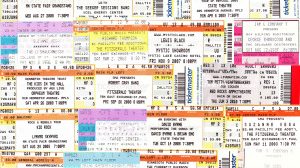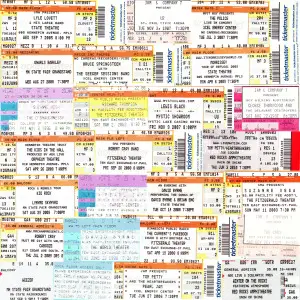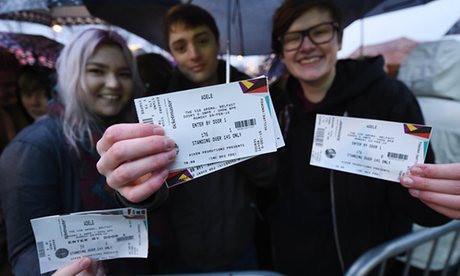
The Black Keys are the middle of a ticketing issue that could predict more problems in the future.
Last Thursday (September 19), the Black Keys played a gig at the Wiltern Theatre in Los Angeles, their first return to the stage in about a year. Being a club show, tickets were in limited supply and in high demand.
Fair enough. Another night in rock’n’roll. But although the gig was sold out, there was a little more room to move about than usual. Why? Because the venue was under orders to turn away people who bought tickets on the secondary market. Those who presented tickets purchased through StubHub, Vivid Seats, SeatGeek, and so on were told they weren’t getting in.
The original price of the ticket was $25. Those who spent upwards of $800 on a ticket from StubHub or whatever, did not get in.
Why not? Because someone associated with the presentation of the concert–which might be the band, their management, the promoter, or the label–decided on a policy that tickets to the show were 100% nontransferable. That meant the only way in was to have purchased a ticket yourself from the original seller–in this case, Ticketmaster–and use the ticket to gain admission for yourself.
If you bought tickets from Ticketmaster and then tried to flip them on the secondary market, they were declared null and void. No Black Keys for you.
Who made this call? Indications point to the band itself. They issued a statement: “Last night’s concert tickets were $25 and geared toward the fan club. This was our first show in over four years and the kickoff of the Let’s Rock Tour. Because we were playing a venue far smaller than the rest of the venues on the tour as a warm-up show, we turned off ticket transferability to ensure that our fans got in the door at the low ticket prices we set for them.”
Getting rid of transferability was apparently a tactic to punish the secondary sellers for marking up tickets 500-800%. However, this does raise some interesting questions.
- Did Ticketmaster make it clear to buyers that tickets were not transferable? Or is this something that happened after the fact?
- Who controls a concert ticket from initial sale to the gig itself? Who has the right to say what an what cannot be done with the right of attending a show? A ticket is like a revocable passport that allows the bearer to the right to admission. Does it remain under the control of the issuer? The entity that grants a license for sale to the issuer? The person who buys the ticket?
- Should a performer be able to say “I want my fans to get into my gig for $50?” Or should standard market forces be allowed to take over? (My take: Yes. Absolutely.)
- Couldn’t the invalidated/cancelled tickets in this case been resold at the venue box office at the correct price? Just askin’.
- And what do governments think about all this?
In Ontario, the proposed law known as the Ticket Sales Act 2017, reads “(e) prohibiting any person who makes tickets available for sale from limiting the transferability of the tickets or prescribing the manner or circumstances in which the person may limit the transferability of tickets made available for sale.”
It’s expected that ALL paper concert tickets will be eliminated by 2025. Handing a piece of paper allowing you admission into a gig will soon be awfully old-fashioned.
I spend a LOT of time thinking about the issues facing the concert ticket industry.
Right now, I’m mulling over the idea of ticket lotteries. Fans have to log in to be eligible to get a ticket. If you get one, sweet, but only YOU can use it (mechanism to be determined). If you don’t, well, too bad. The show will still be considered sold out but capacity will inevitably be less than 100% (i.e. the sellout number minus those lottery winners who couldn’t make the gig.) This is essentially what The Grateful Dead did for decades.
Will concert tickets become more like plane tickets? When you buy a seat on a flight, no one gets that seat but you. If you gave a ticket purchased in your name to someone else, they’d never get on the plane.
Another way to express that is that a concert ticket is a license to get in to a gig that can be taken away from the purchaser if there is some kind of violation of that license. This is NOT a matter of property rights.
How about this: If you want to buy a ticket for yourself, you get it for one price. If you buy it to flip, then charge that person a 200% markup. We’ll need some kind of app for that.
Another option: Create a situation whereby the artist benefits from the extra markup on the price of a ticket sold on the secondary market. There’s gotta be an app for that, too, right?
Background here. (Via Chris)




Technically, wouldn’t that be punishing the fans? The scalpers already made their money when they sold the ticket… the fan bought the ticket at an increased price, so they would be a big fan if they are willing to pay more. Maybe if they required that you put your picture on the ticket and if it doesn’t match then you don’t get access… then if you are sold a ticket then you would not pay once you see that limitation… Or maybe some kind of concert passport that is linked to the ticket… just an idea…
I think the problem is that scalpers are punishing the fans by buying tickets only to make a profit. I’ve seen resell tickets on TM minutes after they went on sale. The secondary market should only exist as a place for fans to sell tickets to shows they can no longer attend. Personally if I ever sell tickets to a show I always do so at face value.
Regarding the other option: “Another option: Create a situation whereby the artist benefits from the extra markup on the price of a ticket sold on the secondary market. There’s gotta be an app for that, too, right?”
They already have this. They are called “Platinum Tickets”. According to TM “Platinum Tickets are tickets that are dynamically priced up and down based on demand.”
Want to see how rediculous an idea this is, look up the upcoming Green Day tour. Most of the floor and much of the lower stands fall in this category. They are trying to charge fans up to $1,000 for a first row seat in the SkyDome.
I pay to go to 30+ shows a year (aka not in the industry) and have been for the past 4 years. I can tell you that from my experience, this letting the market dictate prices doesn’t currently work. It manifests as the bands or maybe TM jacking the price up to near or above scalper prices.
I don’t like the lottery method either. Again, I go to a lot of shows. I don’t want a computer deciding if I’m in or not. I’d rather just go back to standing in line at a TM location day of for tickets. At least that had a err of being transparent.
In the state where the show took place (California), reselling tickets is completely legal so essentially what The Black Keys did is deny people their legal rights, not to mention punishing regular people who may have bought the tickets as a gift for someone but had it go to waste because they were unable to transfer them.
Additionally, no band or artist should be able to gauge their customers in order for those customers to be able to legally resell those tickets. It would be like GM saying “you want that car, it’s $20,000 and if you want to be able to sell it, it’s $40,000 and you can only do it if we say so.”
No other recreational good would get away with the stunts that The Black Keys and Ticketmaster pulled, and it’s about time legislators get involved to protect consumers against this monopoly and ensure we are able to exercise our legal rights.
This issue started when TM went paperless, with (likely) an equal amount of poor planning and communication. What about buying tickets as gifts? Parents buying for kids (who may or may not be going – perhaps another parent is the chaperone)? If I buy a ticket, you’d better offer some kind of cancellation insurance (like your airline example) in case I can’t go. At the price of some big production shows these days, why should I not be allowed to sell a ticket I can’t use?
The other bigger issue for me is, considering TM is one of the biggest profiteers from reselling, despite their denials about the trade show in Vegas, are they allowing themselves to profit off fans regardless, along the lines of stock brokers who profit whether the client profits or loses? I have to jump through ridiculous hoops, wait in “queues”, join waiting rooms, find all of the traffic lights in Captchas that do NOTHING to stop bots, but everything to slow down actual fans, and they’re driving fans to secondary markets that they own.
The Ticket Sales Act received royal assent in BC on May 13th. It doesn’t explicitly prohibit restricting the transferability of tickets, but it does say the government can make regulations about that later.
But it DOES say that a secondary ticket seller and the operator of a secondary ticket selling platform must provide a guarantee of a full refund of the ticket price if the ticket does not get the buyer access to the event. So if the Black Keys were to do something like this in Vancouver and StubHub permitted those tickets to be re-sold on their platform despite their non-transferability, StubHub could find themselves on the hook for a lot of refunds.
I’ve been a huge concert fan for years…I have camped overnight to get tickets back in the day when everyone had a chance of getting a decent seat at fair prices. It never happened. And you can’t tell me that can only get a seat in the nosebleed section when tickets went onsale a few minutes before. I have even seen ticket agents printing off tickets for friends just before they started dealing with the first person in line. I was able to get a great seat only once. So many seats are “compted” or reserved for industry people, fan clubs, radio stations and sponsors before they even go on sale. I approached the government to do something about the monopoly that Ticketmaster has had for years. Their position, concert tickets represent such a small portion of our GDP, that they didn’t want to get involved. Pearl Jam tried to boycott using Ticketmaster years ago…they lost.
Fast forward a number of years and Ticketmaster sets up StubHub, which allows them to take the best tickets and resell them, essentially making them “legal” scalpers. Again, artists like Bruce Springsteen and others protested but it didn’t do much good.
Lotteries…interesting idea, limiting transferability, another possible option. I doubt they will ever come up with a solution.